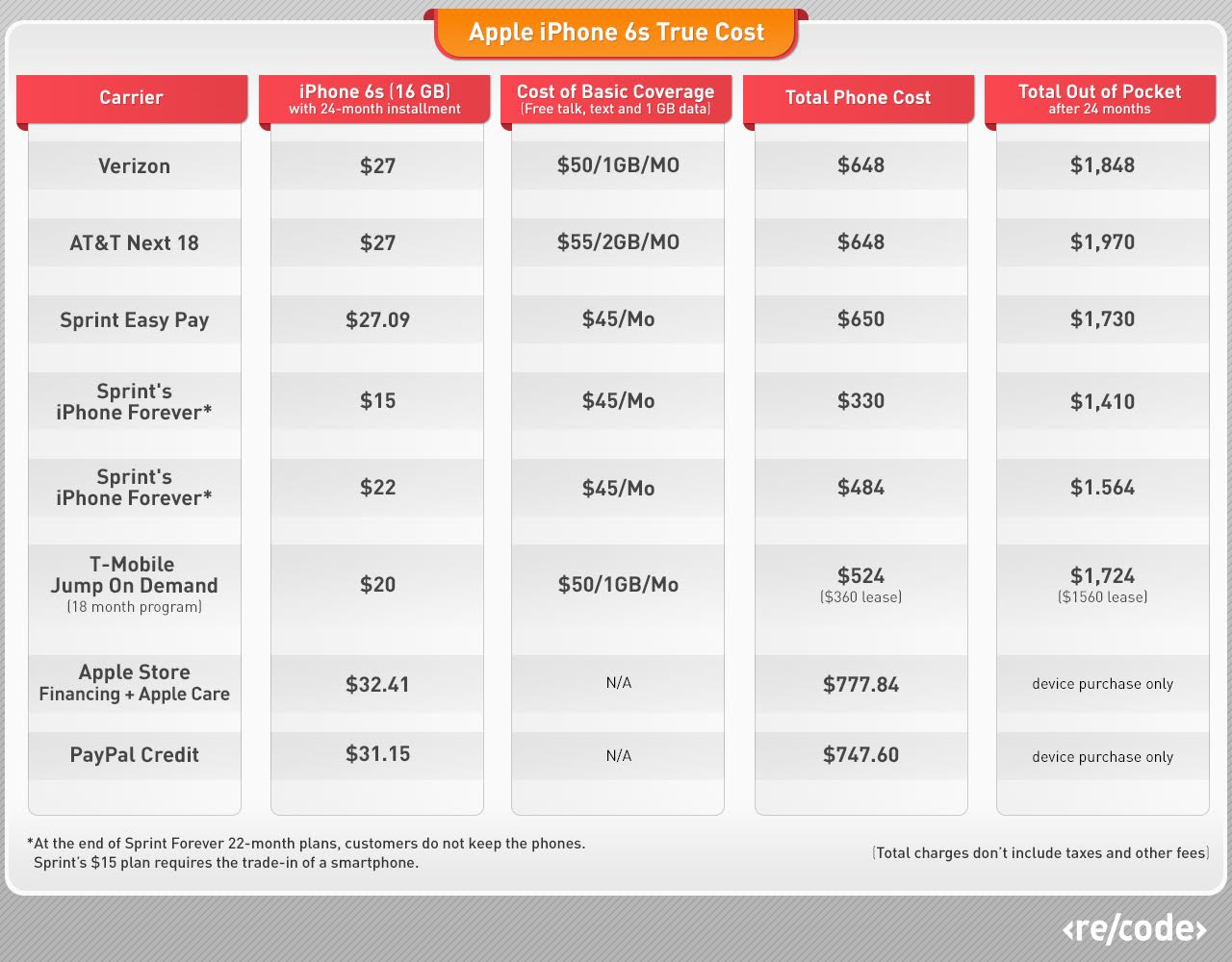
Source: Re/code
True Cost of the iPhone 6s
September 15, 2015 4:30pm by Barry Ritholtz
This content, which contains security-related opinions and/or information, is provided for informational purposes only and should not be relied upon in any manner as professional advice, or an endorsement of any practices, products or services. There can be no guarantees or assurances that the views expressed here will be applicable for any particular facts or circumstances, and should not be relied upon in any manner. You should consult your own advisers as to legal, business, tax, and other related matters concerning any investment. The commentary in this “post” (including any related blog, podcasts, videos, and social media) reflects the personal opinions, viewpoints, and analyses of the Ritholtz Wealth Management employees providing such comments, and should not be regarded the views of Ritholtz Wealth Management LLC. or its respective affiliates or as a description of advisory services provided by Ritholtz Wealth Management or performance returns of any Ritholtz Wealth Management Investments client. References to any securities or digital assets, or performance data, are for illustrative purposes only and do not constitute an investment recommendation or offer to provide investment advisory services. Charts and graphs provided within are for informational purposes solely and should not be relied upon when making any investment decision. Past performance is not indicative of future results. The content speaks only as of the date indicated. Any projections, estimates, forecasts, targets, prospects, and/or opinions expressed in these materials are subject to change without notice and may differ or be contrary to opinions expressed by others. The Compound Media, Inc., an affiliate of Ritholtz Wealth Management, receives payment from various entities for advertisements in affiliated podcasts, blogs and emails. Inclusion of such advertisements does not constitute or imply endorsement, sponsorship or recommendation thereof, or any affiliation therewith, by the Content Creator or by Ritholtz Wealth Management or any of its employees. Investments in securities involve the risk of loss. For additional advertisement disclaimers see here: https://www.ritholtzwealth.com/advertising-disclaimers Please see disclosures here: https://ritholtzwealth.com/blog-disclosures/
What's been said:
Discussions found on the web:Posted Under
Previous Post
MiB: Jason Zweig on Luck's Role in FinanceNext Post
Finance Festival 2015

What I don’t get about Apple’s upgrade plan is (i) after one year they’ve only recovered ~ 50% of the expected selling price, (ii) they then “sell” you another one on the same lease program, but what happens to the first one – isn’t a flood of one-year old phones going to depress prices and demand all-round when changes from one year to the next are mostly marginal?
And what is the accounting for the first transaction when they can’t be expected to receive the full list sales price? They don’t have these issues when the financing transaction is on the carriers’ books, but now they’re bringing it on their own books.
All I hear is how this is going to cement Apple’s relationship with the consumer, but aren’t there deeper financial implications? Genuinely confused and curious…
@par1: This is a total win-win-win for Apple. They can maximize their capital investments by helping ensure demand for each new iPhone model every 12 months; they bundle AppleCare+ into the price which benefits both buyer and Apple (on margins at time of sale, and quality of handset at trade-in, ensuring high resale value); and it provides a new inventory and revenue stream to resell “certified pre-owned” iPhones (i.e. borrowing from BMW’s business model) into global markets where many folks can’t afford brand-new iPhones. Oh, and Apple doesn’t have to share purchase revenues with the Telcos, further boosting their profit margins. Given that iPhones tend to be pretty durable, it’s a good bet this will be another boon to their bottom-line.
As for consumers, they’ll have access to the newest, fastest and most feature-laden iPhones at a relatively affordable premium. If you’re using the phone for business purposes and can write-off the expense of the handset and cellular plan, this is a no-brainer. For the techies and gotta-have the latest status symbol baubles, same thing. For the rest of us, you can sit tight until you want to upgrade or step-up annually. Here’s a pretty good companion article with more details:
Here’s the Skinny on Apple’s iPhone Upgrade Program
http://www.loopinsight.com/2015/09/12/heres-the-skinny-on-apples-iphone-6s-upgrade-program/
I have a 5s. My wife has a 6. I’d like a 6 or 6s to get Apple Pay. But I’m cheap and won’t get a new phone until next February when my 24 months with the 5s are up. For some reason my company will let me upgrade after 24 months even though I have perfectly useable phone. It has to be worth something to me to be able to upgrade every 12 months rather than every 24 months. Don’t know what that is though.
I remember some financial pundit saying that it was worth billions to figure out when the average person would refinance their mortgage. It’s probably worth more to figure out how much the average person will pay to have the latest Android or IOS phone in their pocket.
I get the Apple spin as to why this is so great, but with all respect you didn’t answer my question about how this affects the accounting for the initial sale. For now, when Apple sells a phone to ATT/VZ/TMO etc, they record the whole sales price as revenue (and I don’t believe there was much margin in it for the carriers, Apple isn’t into sharing). Under the new program, can they still record the full price as revenue? – I don’t think so.
As for reselling the pre-owned phones, sure, there’s a market for that even now. But the volumes are going to soar under this new plan. And remember, Apple still sells the prior year’s model now, so they are going to be competing with themselves in selling the used phones.
Just questions.…